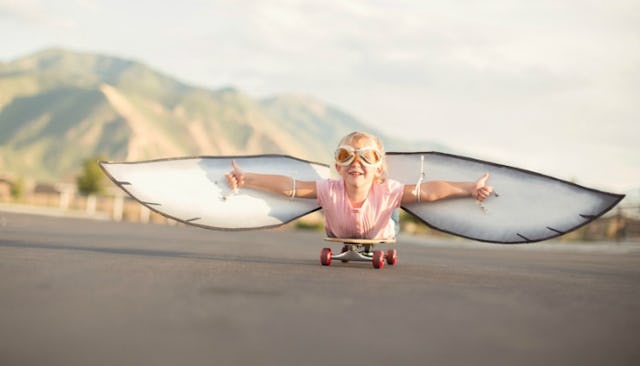Good Things Happen When We Let Our Kids Take Risks

My oldest went skydiving a few weeks ago. She took off with a group of friends and jumped out of a perfectly good plane while, two hours away, her dad and I checked our phones nervously for news of a safe landing.
This is par for the parenting game. About three seconds after I became a parent, every cell in my being zeroed in on the safety of that little bundle. And about three seconds after that, my kids seemed to delight in finding new ways to hurt themselves.
I did all the right stuff: electrical outlet covers, car seats, a lock on the chemicals under the sink, talks about strangers, the internet, drugs and alcohol, driving skills, and safe sex. Still, they found ways to get broken arms, ding the car, and make asinine choices. From their first steps (right into the edge of the coffee table) to the scraped elbows from the epic wreck on the bicycle, 90% of parenting felt like I was chasing them around with bubble wrap, which they’d fling off and set fire to.
Feeling like the worst mom in the world? We’ve been there and done that… get our new free ebook — THE MOM CLUB: 10 Stories to Make You Feel Like a Better Parent.
I put my 3-month-old down for a nap once, grabbed the baby monitor and went to our unfinished upstairs to paint some window frames. My husband came home for lunch that day, poked his head up to say hello, then left a short time later. When I heard the baby stirring on the monitor, I headed down to get her and discovered he’d locked the door, which was always our habit. I was trapped, the baby out of reach with no one around, no phone.
Panic! I calculated how many bones would break if I jumped out the second story window. I tried throwing myself into the door to break it down. (It doesn’t work like it does in the movies.) Everyone else in the cul de sac was at work, except…a solitary teenage boy who was playing basketball several doors down. I screamed at him, hanging out the window and waving my arms like an insane person until he came over, let himself into my house, and freed me from my prison. (Clearly, his parents had not taught him about Stranger Danger.)
This same child locked herself in her room as a toddler, and I sat on the other side of the door, our fingers touching underneath, frantically fumbling with the skeleton key. There is nothing so agonizing to a parent as being helpless to reach a child who needs you.
Ask any parent of a chronically ill child, watching as they’re wheeled to yet another procedure. Ask the parents denied access to their adopted child month after month while foreign governments sift through red tape. Ask divorced parents who share custody with an irresponsible or abusive ex. Ask parents of deployed soldiers. It’s all part of the package, except, eager to reproduce, none of us ever reads the fine print.
A friend who recently dropped off her kid at college lamented to me that she couldn’t stop worrying about something happening and not being able to get to her daughter. I get it. My own is scheduled to study abroad next semester and I’ll admit to feeling similar twinges, especially after Paris, Brussels, and Nice hit the news cycle. But that’s fear talking. And fear is not the boss of me. “Love is what we’re born with,” says Marianne Williamson. “Fear is what we learn here.”
Parenting is nothing if not risk. From the time they’re born, we perform a kind of catch and release with our hearts. It’s a tight wire balancing act: Keep them close, then send them out; swoop in to rescue, but let them learn to fall. The end goal is, after all, to work ourselves out of a job.
Full disclosure: I grew up in the ’70s and ’80s when we rode our bikes miles from home (sans helmets) and drank straight from the garden hose. The Surgeon General was barely even a thing. I’m in favor of running barefoot, grabbing the mane on a galloping horse, climbing trees, and “Swing higher, Daddy!”
Yes, there are moments of panic and anguish as a parent, times when you can’t protect your child or prevent every misstep. Did we really believe it would all be giggles and lollipops? We can’t fetishize safety because of a world that feeds off fear like it’s sugar. When did failure become the new F-word? Failure is the only way forward.
The flip-side of risk is where the good stuff hides out. The flip-side of risk is connection, creativity, a life with flourish. Sometimes, we have to let go of the back of the bike and quit running along behind. I’m too old for that noise, for one thing. And parenting was never supposed to be about my fear — it’s about their launch.
Don’t forget the free ebook: THE MOM CLUB. Download it here.
This article was originally published on